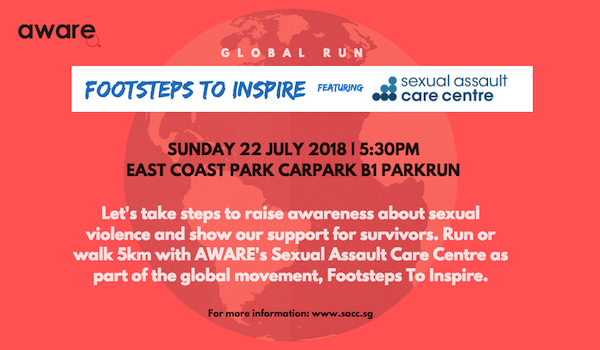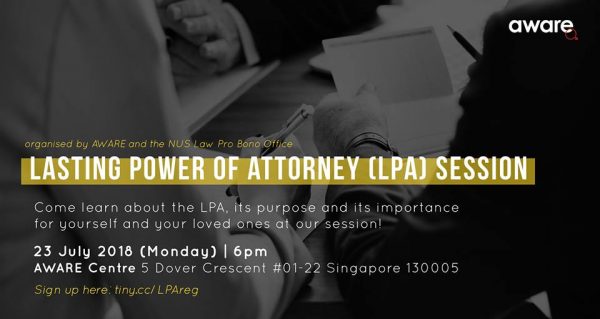AWARE has called for the law criminalising suicide to be reformed – urging that it should no longer be an offence. We also made recommendations to improve first response so that persons attempting suicide – who are already in distress – are not further traumatised by experiences of arrest. Here is Cara’s story.
Content warning: suicide attempt
The following unabridged story was submitted by a member of the public.
I was born into a middle-income family, which consists of my parents and an elder brother who is 7 years old older than me. Most of my childhood, I love and have great passion to go to nature, play around and make new friends, laugh and join in in any festivities that the school or student care centre would have. When I arrive back home, I felt pressured and not cared for nor understood by my three family members. My passions at a young age was taught by my Mother that it is not useful, nor will it help you in your future, such as my immense interest and love of dancing, making friends, choosing to study what I love, and really having my own opinions about what I love to do. I felt I was being subjugated and often thought to myself when I was young, that I am “being controlled and force by my parents without a say for myself”.
In the 3 to 4 years of time, this slowly escalated to a point where I felt depressed and indeed I became severely depressed. At this age, I was in Primary School and had lots of fears such as making friends, fear of being laughed at, fear of being a joke in school, and so on. I suffered low self-esteem and experience low self-worth about myself. My external appearance became a façade expressing fake happiness and trying to look the very best to others that “I am fine”. While on the inside, I was already feeling depressed and suicidal. The thought recurred again and again to me that there is “no way out of this”, about how I was depressed, and I did not feel that even my friends that I have in Primary School, nor people who are close to me such as my physical family, or my Teachers were people whom I can approach to ask for help. Because in that state, where I was at the time, I did not feel that I will be understood by any one, even if they were Adults or Professionals like Counsellors, even if they say they do understand. I felt thankful at that time knowing that there were people whom truly wants to help me, yet the excruciating pain deep within of knowing no one truly understands me nor will attempt to do so, pushed me harder into a corner.
The day came at the age of 7 years old, where I decided to attempt to commit suicide. It wasn’t an easy thing to do, as I look down and think about what I am about to do, my entire 7 years of life flashed in front of me, showing me the pain that I was going through and how much do I want to endure any longer in ‘this life-time’. So much of my 7 years of life, I felt so much pain of not being able to do what I love to do, speak how I want to speak and dress how I want to dress. I love running around in nature, enjoying the flowers, exploring the books that I love reading, enjoying myself with learning, but not the punishment, caning, scolding from my Parents, and of feeling repressed from accessing my creativity as a child and youth.
As I held the pen-knife to my wrist and tried to draw blood on my wrist, I saw how much pain I had deep inside of myself. I cried for a long time and felt a lot of the pain, which flowed with my tears, these were all the sufferings that had accumulated with all the years. Once, I had finished crying, I realised what I had to do. I told myself that I am going to live my life doing what I love to do from my Heart, every moment in this lifetime, to live fully and choose my passions and loves because this is the only life-time that I have with me. This incident changed my life truly and woke me to follow my Heart towards my Happiness in life.
Fast-forward to where I am now, I am working as a Teacher Assistant in one of the Special Needs School, in my other time, the other interests that I find myself doing is yoga, snorkelling, cooking and baking, volunteering at other non-governmental charity organisations as well. These interests that I take part in, was because of my firm decision to follow my heart and go to pursue my passions. When I find that I am not doing what I love to do, it causes me immense pain and I don’t find this connection to my purpose in my life, which unfortunately my parents would express their objection towards my participation in these activities
It took me effort indeed to come out of my depression state, to love and care for myself by going for my passions and loves in life. There is so much wonder in the world at the ages of 3-7 years old that I see and want to experience intimately, and there always is the magic and wonder that I can still can see.
The message to the people who reads this is Dare to go for your passions and loves, even if there may be disagreements and rejections from close ones that you know. Follow your heart always because it is the path to your Happiness in this life-time. How do you want to experience this life? Living your life by not doing what you truly love, or living your life by doing all that you truly enjoy and it makes your heart and body sing with every fibre of your being. Everyone does dies, even a King whom is royalty by birth, but how you truly live in every breath of you makes you who you are.
The second message is Don’t give up, people who may be going through a suicidal stage of your life. What that I have taken away from my own personal story, is that it is not true that no one cares or loves you. There is always people who truly are open to listen to you. Don’t be afraid to open up and speak to them. I was one as well, and it was not easy for me to understand that people will truly listen to every bit of your story. You are worthwhile to live your life and life is wondrous to live, you are also worthy to open yourself to others who truly wants to help you. Step out and approach to people who cares like AWARE, SOS and other organisations, to your school teachers, counsellors if speaking to a close family member is difficult for you. Don’t be afraid that your hurts buried deep within are not worthy to be heard by others, they are, mine is, and I am sharing mine with you here. I am 28 years old now, and I have been living an adventurous life, and will continue to be enjoying living every fibre of my being as well in my lifetime.





